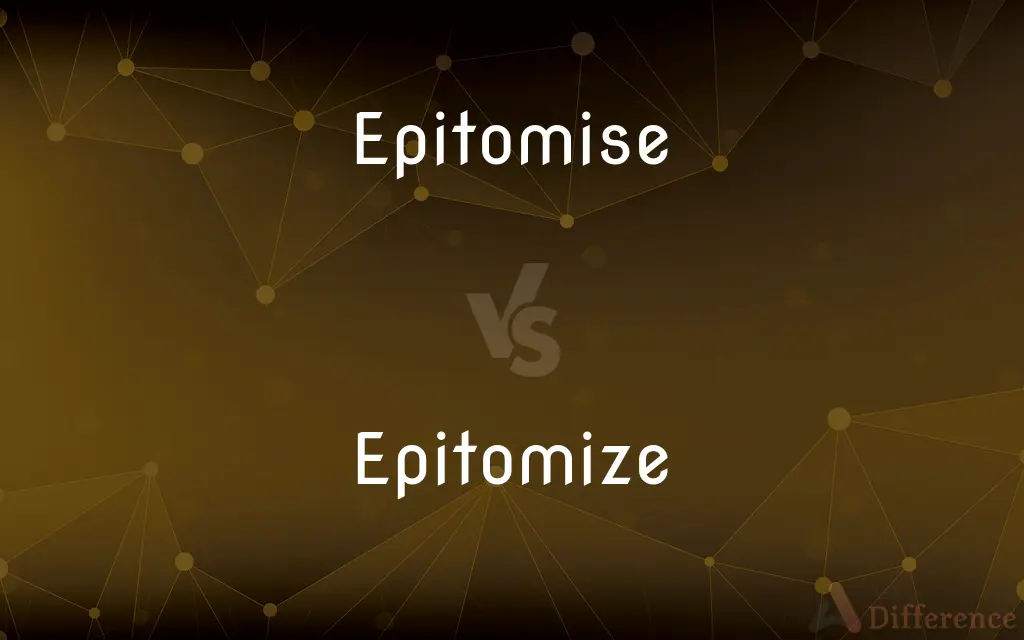Epitomise vs. Epitomize — What's the Difference?
By Fiza Rafique & Urooj Arif — Updated on April 21, 2024
Epitomise and epitomize both mean to summarize or represent something perfectly, but differ mainly in their spelling; 'epitomise' is British English, while 'epitomize' is American English.

Difference Between Epitomise and Epitomize
Table of Contents
ADVERTISEMENT
Key Differences
Epitomise is commonly used in British English to describe the act of summarizing or representing the essence of a subject perfectly. On the other hand, epitomize is the preferred spelling in American English, serving the same function.
In terms of spelling conventions, epitomise follows the British practice of using 's' in places where American English uses 'z', such as in 'realise' vs. 'realize'. Whereas epitomize adheres to American spelling conventions, which often favor the letter 'z'.
The pronunciation of epitomise and epitomize remains consistent across both forms of English, focusing on the soft 's' or 'z' sound, despite their spelling differences. However, the pronunciation is influenced by regional accents which may emphasize different syllables.
When it comes to usage in literature and formal writing, British authors and publications prefer epitomise, reflecting traditional British English spelling. Whereas, American writers and media use epitomize, aligning with the norms of American English spelling.
Both terms are used in similar contexts to indicate a summary or an exemplification of a broader concept or type, regardless of the spelling differences. This demonstrates the versatility and adaptability of English spelling across different regions.
ADVERTISEMENT
Comparison Chart
Spelling
Epitomise
Epitomize
Pronunciation
/ɪˈpɪtəmaɪz/
/ɪˈpɪtəmaɪz/
Usage in literature
Common in UK
Common in USA
Grammatical norm
Follows British conventions
Follows American conventions
Regional preference
Preferred in UK
Preferred in USA
Compare with Definitions
Epitomise
To perfectly represent something typically.
She epitomises British politeness.
Epitomize
To be a perfect example of a quality or type.
Her speech epitomized clarity and conviction.
Epitomise
To summarize or condense the essence of a subject.
The article epitomises the main arguments.
Epitomize
To embody or symbolize to an ideal degree.
She epitomizes grace under pressure.
Epitomise
To illustrate or clarify by giving an example.
This case epitomises the complexity of the issue.
Epitomize
To summarize or condense the essence of a subject.
The documentary epitomizes the struggle for rights.
Epitomise
To be a perfect example of a quality or type.
His work epitomises modern architecture.
Epitomize
To illustrate or clarify by giving an example.
This law epitomizes the reform efforts.
Epitomise
To embody or symbolize to an ideal degree.
He epitomises the entrepreneurial spirit.
Epitomize
To perfectly represent something typically.
She epitomizes American ingenuity.
Epitomise
(British spelling) epitomize
Epitomize
Be a perfect example of
The company epitomized the problems faced by British industry
Epitomise
Embody the essential characteristics of or be a typical example of;
The fugue typifies Bach's style of composition
Epitomize
Give a summary of (a written work)
For the benefit of our readers, we will epitomize the pamphlet
Epitomize
To make an epitome of; sum up.
Epitomize
To be a typical example of
Behavior that epitomizes selfishness.
Epitomize
To make an epitome of; to shorten; to condense.
Epitomize
To be an epitome of.
Epitomize
To make an epitome of; to shorten or abridge, as a writing or discourse; to reduce within a smaller space; as, to epitomize the works of Justin.
Epitomize
To diminish, as by cutting off something; to curtail; as, to epitomize words.
Epitomize
Embody the essential characteristics of or be a typical example of;
The fugue typifies Bach's style of composition
Common Curiosities
Is the pronunciation of epitomise different from epitomize?
No, the pronunciation is generally the same, though regional accents might affect it slightly.
Are there contexts where epitomise and epitomize should not be used interchangeably?
In formal writing specific to a region (like academic papers), it's advisable to use the spelling preferred in that region's version of English.
Can epitomise and epitomize be used interchangeably?
Yes, they can be used interchangeably in the context of international English, though regional spelling preferences should be considered.
How should I choose between epitomise and epitomize when writing for a global audience?
When writing for a global audience, consider the prevalence of American vs. British English among your readers or choose a neutral style guide that specifies the preferred spelling for international publications.
Does the use of epitomise or epitomize affect the readability of text for international readers?
Not significantly; both spellings are well understood by English speakers around the world, and context usually clarifies meaning, ensuring readability remains high.
Why does British English prefer 's' and American English 'z' in words like epitomise/epitomize?
This difference in spelling is part of a broader divergence in British and American English conventions, historically influenced by lexicographers and educators in each region.
What are common synonyms for epitomise and epitomize?
Common synonyms include embody, exemplify, personify, and typify. These synonyms reflect the notion of being a perfect example or representation of something.
What is the main difference between epitomise and epitomize?
The main difference is the spelling; 'epitomise' is British English and 'epitomize' is American English.
Are there any digital tools that automatically convert British to American spellings and vice versa, including words like epitomise/epitomize?
Yes, several word processors and online tools offer language preference settings that include spell check and conversion features, adapting British spellings to American ones and vice versa.
What is the historical reason for the spelling differences between British and American English like in epitomise and epitomize?
The spelling differences largely originate from the early 18th to 19th centuries when American English adopted more phonetic spellings under the influence of lexicographers like Noah Webster, who aimed to simplify many aspects of English spelling.
Share Your Discovery

Previous Comparison
Papa vs. Pappa
Next Comparison
Door vs. HatchAuthor Spotlight
Written by
Fiza RafiqueFiza Rafique is a skilled content writer at AskDifference.com, where she meticulously refines and enhances written pieces. Drawing from her vast editorial expertise, Fiza ensures clarity, accuracy, and precision in every article. Passionate about language, she continually seeks to elevate the quality of content for readers worldwide.
Co-written by
Urooj ArifUrooj is a skilled content writer at Ask Difference, known for her exceptional ability to simplify complex topics into engaging and informative content. With a passion for research and a flair for clear, concise writing, she consistently delivers articles that resonate with our diverse audience.














































